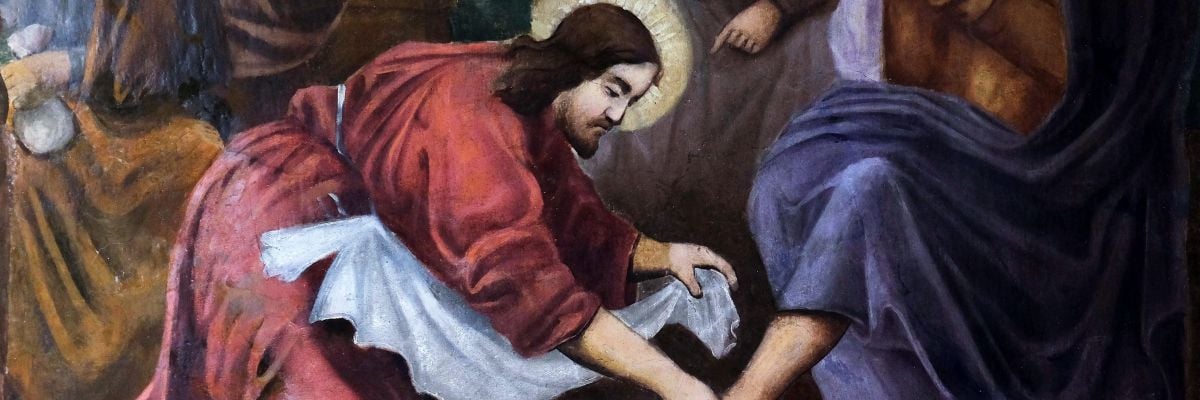
Homily for the Fifth Sunday of Easter, Year C
When Judas had left them, Jesus said,
“Now is the Son of Man glorified, and God is glorified in him.
If God is glorified in him,
God will also glorify him in himself,
and God will glorify him at once.
My children, I will be with you only a little while longer.
I give you a new commandment: love one another.
As I have loved you, so you also should love one another.
This is how all will know that you are my disciples,
if you have love for one another.”-John 13:31-33A, 34-35
“As I have loved you.” These words give us the most essential aspect of the Savior’s new commandment. “Love one another” is a real challenge, to be sure, but “as I have loved you” takes the commandment to an explicitly deeper level of action.
Perhaps we have never considered the matter, but after years of being a priest I have concluded that it is much easier to love than to be loved. When we are doing the loving, we are in some way in control of things: we choose to love and whom to love and how to love them. The choice and object and manner of loving is up to us. Very many people become quite skilled at dispensing love. And this is very good; we could not do without it.
But “as I have loved you” tells another, deeper story: the story of One who took the initiative, and loved first, without any demand for a return of love; of One who loved freely and willed to leave those whom he loved likewise free. Christ first loved us, as the apostle says, “while we were yet sinners” —that is, when we were in no wise loveable. His love constitutes our loveableness.
This kind of love that takes the initiative utterly is sort of wild, if we may put it that way. To love others not as the result of any expectation of exchange, not as a transaction or act of justice, this means that the lover in a sense relinquishes control over the beloved. The lover hopes that the beloved may flourish with his free gifts of love, and will delight if he does and give him even more love. But not as an exchange in justice; rather just because the lover has always been so inclined. The increase or return of love is a “reward” only in the sense that it is a sign of the lover’s joy at the progress of the beloved who has been loved first, not because he pays back the response.
And what is this progress in love of the one who has been loved first by the One who has loved first? It is the growing capacity to receive love! It is his imitation of the initiative of the One who loved first. This is the “virtuous circle” of the deepest level of our moral lives as Christians: always to be receiving Christ’s gifts. And experiencing that to receive his love is to bestow it as he does, by loving first. Even the Savior chose to be a human child, a little baby, the very image of one who is a pure object of love, apparently unable to do anything for anyone: wrapped tight in swaddling clothes in the confines of the wooden manger as he would later be bound on the wood of the cross and laid in the tomb.
This may be hard to understand, but not so if we remember the risk we take in loving. Spouses and parents know this well. We have to love first and remain faithful, not surrounding our love with a million conditions. There is a place in every loving relationship for this freedom. The father must let his son grow up, and so this implies that he must let himself be exposed to hurt or disappointment, but this is because his love for his son was never about himself, but was a free gift. The same goes for daughters, spouses, friends.
The only way we will ever understand the suffering of the Savior for our salvation is if we understand this: that, in the words of the Holy Week liturgy, he handed himself over to us to be hurt. And that was always his intention. The Passion of the Lord is not just a staged guilt-trip for sinners such as we are; it is his infinitely sincere, powerful love, able to triumph precisely because it loves first, and not just once, but all of the time.
The gates of hell were guarded by the distorted, bitter, sheer justice of the fallen angels. In order for the Lord to burst them and cast them down in his resurrection he had to be completely free of this transactional spirituality, this spirit of exchange, reward, and accusation. He was, as the prophetic words of the Old Testament say, “free among the dead.”
If his love for us were based on a just exchange, he would just have been the devil’s competitor, that is, just another demon. But we know him as the Lord of Love and the King of Glory who is our defender and savior!



